
Main Page
Film Festivals
|
20th Century Women 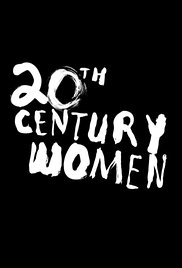 In 1979, Dorothea Fields (Annette Bening) lives with teenage son, Jamie (Lucas Jade Zumann), in a dilapidated house in Santa Barbara, California. William (Billy Crudup), the carpenter, is the only man other around ever since her divorce. Unable to persuade her son to bond with William and not knowing what to do about it all on her own, she asks Jamie's friend, Julie (Elle Fanning), and Abbie (Greta Gerwig), a photographer renting a room in the house, to help guide Jamie onto the right path in life. There have been many films throughout history about dysfunctional families. Some of them reach the heights of The 400 Blows, Boyhood, Ordinary People and American Beauty while others reach the lows of painfully schmaltzy films like The Family Stone. 20th Century Women falls somewhere in the mediocre middle. The screenplay by writer/director Mike Mills avoids schmaltz, but it feels simultaneously overstuffed and undercooked with a lazy, dishonest third act. Occasionally, there's some witty dialogue and comic relief to be found, but this is much more of a serious drama than a comedy. Is the love triangle between William, Dorothea and Abbie really necessary, though? It adds some welcome dark elements to the narrative, but it also feels creepy and poorly resolved by the end. The sequences with the car driving down the highway look visually trippy, but come across as distracting and pretentious while taking away from the film's realism. Each character is flawed which makes him or her all the more interesting, especially Dorothea who behaves like a narcissist more often than not. Her relationship with Jamie falls apart once she tries to get Julie and Abbie do her job of parenting him for her. They have problems of their own that they're dealing with respectively, so they're not exactly be the best role models for him. While it's nice to see some richly-drawn characters with arcs in a film, unfortunately, Dorothea's character arc is not quite believable because it's too rushed, oversimplified and contrived. Do you remember the symbolism of the plate that Beth broke into two pieces in Ordinary People? Both Beth and Dorothea are the kind of people who think that they can just glue the plate back together and everything will be fine once again when it really won't because they're both narcissists who, like most narcissists, aren't aware of their own narcissism. Unlike Ordinary People, though, 20th Century Women has a third act that's rather pat and naively optimistic/hopeful. It's as though Mills decided to cop out by playing it safely and became too scared to dig deeper into the darker areas of Dorothea's dysfunctional family life. Annette Bening, 20th Century Women's heart and soul, gives a tour de force, mesmerizing, note-perfect performance. She's so great in her role as Dorothea that you forget that you're watching Annette Bening. In other words, she manages to find the emotional core of her character which is why she deserves an Academy Award for Best Actress. Mike Mills has her radiant performance to thank for saving 20th Century Women from being inert and completely forgettable. 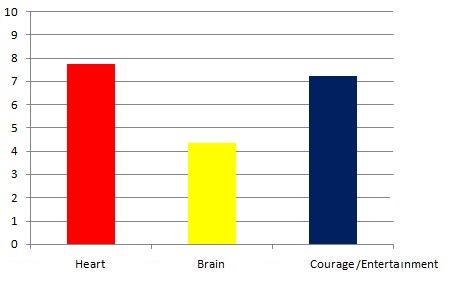 The Lost City of Z 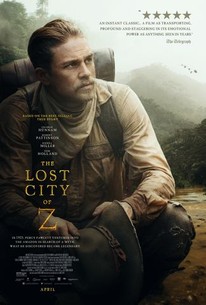 Percy Fawcett (Charlie Hunnam) travels to the Amazon jungles in hopes of finding evidence of an unknown city he calls Z. Corporal Costin (Robert Pattinson) joins him on the expedition. Percy leaves behind his wife, Nina (Sienna Miller) and son (Tom Holland) as he and Costin risk their lives in the treachurous jungles of Amazon. The Lost City of Z isn't your typical adventure film; it's more of a slow-burning drama with a few thrills and adventure along the way. The cinematography looks breathtaking with lush landscapes that look great on the big screen. At times, the attempts to generate pathos feels schmaltzy, but the strong performances, especially by Charlie Hunnam, help to rise above the mediocre screenplay. Could the running time of 2 hours and 20 minutes been trimmed down a bit? Probably, but it doesn't feel tedious or exhausting. The slow pace allows for audiences to become absorbed more easily in the story. This kind of pacing feels refreshing compared to most films which are too fast paced. There's an old-fashioned quality to The Lost City of Z which makes it quite an engrossing experience. 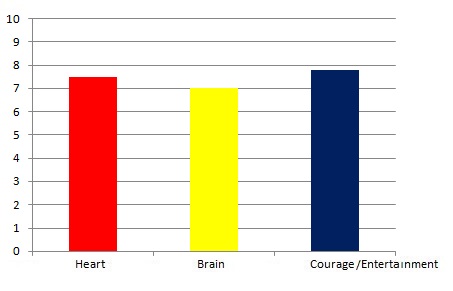 Elle  Isabelle Huppert stars as Michèle Leblanc, a divorced woman who runs a video game company with her best friend, Anna (Anne Consigny). After she gets brutally raped at home, she decides to take matters into her own hands and try to catch her rapist instead of seeking help from the police. Her familial relationships are quite dysfunctional. She's jealous of ex-husband, Richard Leblanc (Charles Berling), when she learns that he has found a much younger lover, Hélène (Vimala Pons), and she dislikes Josie (Alice Isaaz), the fiancee of her son, Vincent's (Jonas Bloquet). She has no shame when it comes to having an affair with her best friend's husband, Robert (Christian Berkel). Based on the novel by Philippe Djian, Elle is a character-driven psychological thriller that goes into unexpectedly twisted directions more often than not. Michèle may not be particularly likable as a character because of some of the choices that she makes and her personality, but it's precisely those flaws that make her all the more interesting as a character. She's given a backstory involving something traumatic from her childhood which won't be spoiled here. That trauma has shaped her current mental state and makes her a complex human being---she's not exactly an easy nut to crack. The darker that Elle becomes, the more captivating and even somewhat gripping it becomes. Director Paul Verhoeven ought to feel very lucky to have Isabbelle Huppert as his lead because she's just the right actress for the role. This is her best role since The Piano Teacher. She tackles Michèle's strength as well as her innate fragility concurrently. Perceptive audience members will be able to grasp the battles with her mental scars which are far more traumatic than physical scars. in other words, Huppert's impeccable acting skills help to provide a window, albeit a small one, into Michèle's head. Although you probably would not want to spend time around Michèle in person, she's nonetheless a truly fascinating character that's complex enough to be open to interpretation. Bravo to Verhoeven and screenwriter David for trusting the audience's intelligence and thereby turning Elle into a smart, sophisticated and riveting psychological thriller for adults.
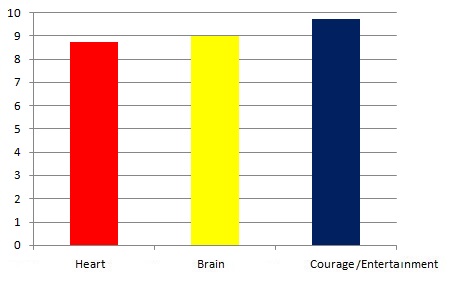 I, Daniel Blake 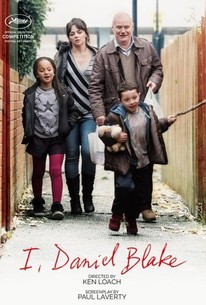 Daniel Blake (Dave Johns), a 59-year-old
carpenter, had been receiving welfare benefits until recently when he received a letter from the
government stating that his benefits are denied and he must find a job. However, under his
doctor's orders, he can't work because of his heart condition after a recent heart attack.
Repeated visits to the welfare office prove to be futile. He's even asked to create a CV and has
to learn how to use a computer. Everything changes when he meets Katie (Hayley Squires) and her
two young children, Daisy (Briana Shann) and Dylan (Dylan McKiernan), at the welfare office. He
generously offers to help her move into her new apartment while she struggles to support her
kids without money or a job. He provides her with something even more valuable than anything
that money can buy: genuine friendship and compassion. Meanwhile, he refuses to give up on his
battle against the unjust welfare system. With its warmth, tenderness and complex characters, I, Daniel Blake is a testament to the humanism of writer/director Ken Loach. The sensitive screenplay remains character-driven, unflinching and true-to-life from start to finish without going overboard in any particular direction. Loach has a lot to say about the bureaucratic nature of the welfare system, but he doesn't pound you over the head with messages nor does he paint those who work at the welfare office as a villains. Equally heartwarming and heartbreaking, I Daniel Blake is fundamentally about the importance compassion toward other human beings, a rare trait these days when most people are shallow, unreliable, inconsiderate and rude. Perhaps Daniel Blake knows how to treat others with respect because he's not obsessed with Twitter, Facebook and other impersonal ways of being personal. The film doesn't have the standard spectacles that tentpole films have. In other words, there are no explosions, high-speed car chases, gunfights or anything else that would require stunts or CGI, but so what? It has plenty of truth, and the spectacles can be found within its truths if you're a perceptive audience member. Its greatest feat, though, is that it actually earns its uplifting, crowd-pleasing third act every step of the way. The convincingly moving performances by Dave Johns and Hayley Squires also help to ground the film in realism while enriching it even further. Both actors become their characters, so Daniel and Katie both feel like complex, lived-in characters rather than caricatures. These are human beings who are worth caring about. Don't be surprised if you'll feel happy when they're happy and sad then they're sad. Most importantly, you'll think about them long after the end credits roll. 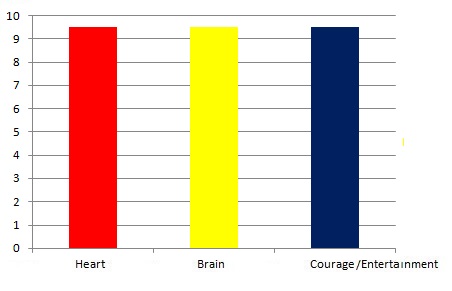 Moonlight  10-year-old Chiron (Alex Hibbert) gets picked on by his classmates and ends up living with a drug dealer, Juan (Mahershala Ali), who becomes his surrogate father, and Juan's girlfriend, Teresa (Janelle Monáe). Meanwhile, his mother, Paula (Naomie Harris), remains unfit to take care of him because she's a drug addict. In his teenage years, Chiron (now played by Ashton Sanders) explores his sexual identity with his friend, Kevin (Jharrel Jerome) while smoking a blunt on a beach with him under the moonlight (hence the film's title!). Ten years later, Chiron (now played by Trevante Rhodes), is no longer the scrawny boy he once was; he's muscular, tough and wears grills. When he stops at a diner, he bumps into Kevin (now played by André Holland) who happens to be his waiter. Moonlight explores many interesting themes within the coming-of-age genre, namely, sexual identity, happiness, individuality and masculinity. Writer/director Barry Jenkins doesn't explore though concepts profoundly per se; they're presented in subtle, gentle ways as you're watching this slice of life drama unfold. Jenkins include exquisite cinematography and use of color that enriches the film. The performance by each actor who portray Chiron is superb and well-nuanced. You can really grasp what's going on inside Chiron's head and care about him as a complex human being. His flaws are part of what makes him more compelling as a character. The transition between his pre-adolescent years and his teenage years works smoothly without the film losing any momentum. Unfortunately, the jump between his teenage and adult years feels like too big of a jump while making you wish that you could've gotten to know Chiron between those two time periods. A much better coming-of-age drama that moved between periods of a boy's life in a much more organic way is Boyhood. Both Moonlight and Boyhood deal with protagonists who come from dysfunctional homes---to be fair, Chiron comes from a much more dysfunctional family than Mason. Compared to Boyhood's emotional depth and sense of realism that also left a lot to the audience's imagination, Moonlight pales by comparison, though. Because of the screenplay's shortcomings toward the end, Chiron's character arc doesn't feel as engrossing and smooth as Mason's by the time the end credits roll. Although Moonlight does have its fair share of poignant moments, it falls short of reaching the heights of powerful coming-of-age classics like Boyhood.
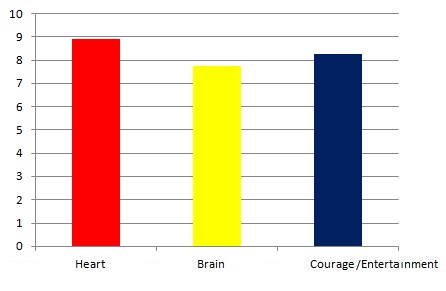 Toni Erdmann 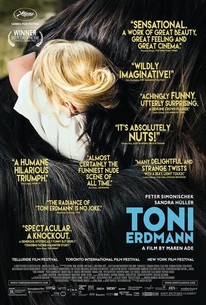 Winfried Conradi (Peter Simonischek), a divorced, retired piano teacher, feels lonely after his dog dies. His estranged daughter, Ines (Sandra Hüller), works long hours for a consulting firm as a business consultant. He decides to visit her out of the blue and follow her to work to try to rekindle their father-daughter relationship through a series of pranks where he dons a wig and false teeth as "Toni Erdmann." To merely describe the plot of Toni Erdmann wouldn't do it any justice. Like many great films, it can't be summarized adequately with words nor can it fit into a genre. On the one hand, it's also a comedy with screwball, witty and absurd humor, some of which is quite bold---please be warned, though: you will never look at a petit four the same way ever again. On the other hand, it's a tragedy with two wounded, lonely souls who come together in spite of their many differences while discovering and learning to love themselves as well as each other. Comedy, after all, is almost always rooted in tragedy. Fortunately, writer/director Maren Ade hits just the right notes as she blends comedy and drama with some depth lurking beneath the surface to allow you to ponder larger issues like the meaning of happiness, family, love and forgiveness. In other words, she grounds the film in humanism, a priceless, truly special effect.
The character of Winfried isn't easy to like because he seems creepy, selfish, annoying and emotionally needy at first, but as the film progresses he becomes somewhat endearing in spite of his seemingly childish behavior. He fundamentally lover her although perhaps he doesn't quite know how to express his love in the usual ways. One wonders what the relationship was like with his own parents. There's much more to him than meets the eye which makes him all the more interesting as a character. Ines is also complex: she seems cold and overworked with a stiff upper lip, but, with the help of her father, she gradually loosens up and starts to confront her buried emotions. The fact that Ines and Winfried come to life is a testament to the raw and convincingly moving performances by Sandra Hüller and Peter Simonischek. Both of them help to make their characters actually feel like they're father and daughter even when they don't speak to one another. Their greatest triumph, though, is that they manage to find the emotional truths of their characters.
The post profound, surprising scene in the film is when Ines sings Whitney Houston's "The Greatest Love of All" as her father plays the piano. Pay close attention to the song's lyrics because they speak volumes about Ines' emotional breakthrough. That scene will probably be remembered the most, but there are other smaller, subtler, quieter scenes that also have leave a powerful emotional impact. Kudos to Maren Ade for trusting the audience's intelligence as well as something that's underrated this days and ultimately rewarding: patience. The understated ending works beautifully and leaves enough room for interpretation. Anyone who dares to call Toni Erdmann shallow either wasn't paying close enough attention to the film and/or is shallow themselves. Whether you see it as a comedy grounded in tragedy or a tragedy grounded in comedy, Toni Erdmann is a profound, heartfelt and outrageously funny emotional journey. It's one of the best films of the year. 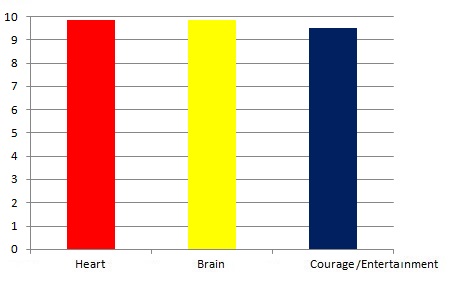 The Rehearsal 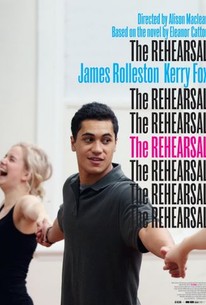 Stanley (James Rolleston) attends drama school where acting instructor Hanna (Kerry Fox) coaches him along with other students. He begins a romance with a younger student, Isolde (Ella Edward) who's 15-year-old sister who catches her 15-year-old sister, Victoria (Rachel Roberts), having sex with her tennis coach, George (Erroll Shand). The coach's sex scandal becomes the subject matter of a theater peacethat Stanley and his classmates rehearse for in school. The Rehearsal's premise sounds like it could be intriguing, and it is for the most part, but it doesn't go deep enough into its dark themes that gradually rise to the surface. It's interesting how the drama class that Stanley attends intertwines with life outside of school. As the saying goes, art imitates life sometimes while other times life imitates art. Hanna helps Stanley and other students to look within themselves to find the emotional truths of their roles along with more kernels of wisdom that help them to be better actors. Stanley goes through an innate conflict when he starts an affair with Isolde. The sex scandal and theater piece about that scandal complicate matters for him as he's unsure of what choices to make. Writer/director Alison Maclean and co-writer Emily Perkins let scenes unfold in a loose, organic way that might not hook you right from the get-go, but give it some time for the narrative strands to cohere. Unfortunately, by the end of the film, you wish you had known more about Stanley and some of the other underdeveloped characters. The contrived, anticlimactic third act is where the film a rather steep nose dive, but it doesn't crash. At least the scenes preceding it feel mildly engaging enough to keep you somewhat immersed in the story, while the performances, especially by the charismatic, underrated Kerry Fox, rise above the material.
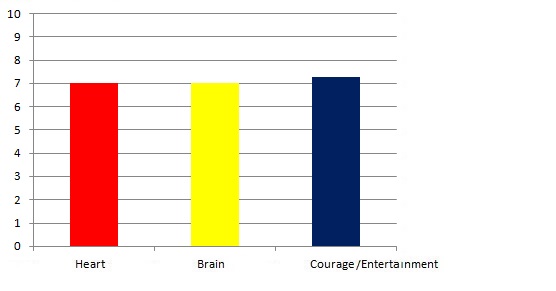 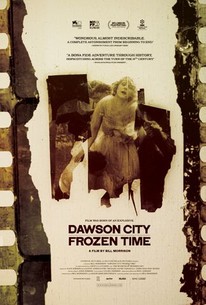 Dawson City: Frozen Time, directed by Bill Morrison, is a consistently fascinating documentary. In 1978, Michael Gates, the former curator of Collections for Klondike National Historic Sites, and Kathy Jones-Gates, director of Dawson City Museum, discovered 533 nitrate silent film reels that were considered lost for years. The films were made and shown in the Canadian town of Dawson City in the 1910s and 1920s. Michael and Kathy eventually got married. Morrison doesn't begin with their heartwarming, uplifting story; he starts by introducing audiences to the history of Dawson City, including the Klondike Gold Rush, and the process of how nitrate film is made. He shows many clips from the unearthered silent films many of which have suffered water damage. There were other silent films from Dawson City that had been tragically dumped into the Yukon River and lost forever. Like Morrison's prior films, there's no narration; he trusts the power of the images and some captions on-screen to enlighten the audience. Seeing this doc on the big screen would be ideal given the power of the archival images which would be diminished somewhat on the small screen. Although the running time of 120 could've been trimmed down a bit with less footage from the silent films, Dawson City: Frozen Time is nonetheless mesmerizing, illuminating, and a must-see for film and history buffs. It opens June 9th, 2017 via Kino Lorber at IFC Center. 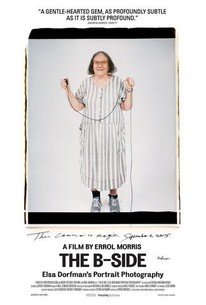 Errol Morris' new film, The B-Side: Elsa Dorfman's Portrait Photography may seem like his slighest doc, but there's a lot going on beneath the surface. Morris avoids talking heads; he merely converses with Dorfman as she displays her photos, describes them and talks about her memories of taking them. As the doc progresses, you gradually learn a little bit more about her background and get to known her as a human being. She's quite warm, humble, funny and intelligent. Each of those traits can be sensed throughout the film. It's well-edited in a way that doesn't allow for it drag. Bravo to Morris for illuminating Dorfman's humanism, above all. This is the most quietly moving doc of his career. It opens via NEON on June 30th, 2017 at Angelika Film Center.
|
The NYC Movie Guru
themovieguru101@yahoo.com
Privacy Policy